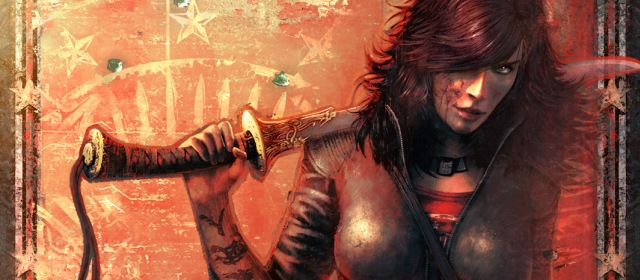Wetwork: a euphemism for assassination or murder, alluding to the culprit’s hands being wet with blood; usually associated with covert operations.
Given the sudden resurgence in “grindhouse” movies in the mid-noughties (thanks mostly to the efforts of Quentin Tarantino and Robert Rodriguez with films like Kill Bill, Planet Terror and Death Proof), it was only a matter of time before a game developer took the idea and ran with it. Although Artificial Mind and Movement’s Wet wasn’t the first game to emulate this niche style of film-making, it is one of the most prolific, and certainly one of the most extreme examples, cutting a slurry of different concepts together like cheap narcotics, from its 70’s-themed soundtrack to the OTT violence, bad language, over-sexualisation and deliberate rough edges.
But Wet is a title that took the grungy, grimy, gritty grindhouse atmosphere a little too much to heart, ending up as a prime example – nay, a cautionary tale – of how too much style and not enough substance really can damage any core concept, no matter how ripe with potential it may initially appear to be.

MEET RUBI MALONE: The story revolves around wetwork specialist Rubi, voiced by honey-tongued Buffy and Dollhouse star Eliza Dushku. Depending on your standpoint, Rubi’s character is either charming and sexy in a femme fatale kind of way, or she’s as insufferable a douchebag as any amoral, mass-murdering smart-ass. She’s a female amalgam of Kane and Lynch, or Salem and Rios. She doesn’t high-five herself as much, but she has the same blasé approach to wanton slaughter as them.
The tale begins with Rubi chasing down a fleeing goon who just double-crossed an apparent crime boss of some kind for the contents of a briefcase – a case that Rubi has been paid to retrieve. Getting hold of this case forms the basis of the first mission, shortly after which it’s revealed to contain a human heart that will, via transplant, save the life of organised crime overlord William Ackers. Quite why the goon at the beginning is buying a blackmarket heart and why Rubi has been paid to kill him and steal it is not explained, and doesn’t really make much sense – but that’s the theme of Wet throughout. This is a game about looking stylish as you perforate, lacerate and decapitate mountains of faceless enemies. The story proceeds from this high-speed kick-off to feature revenge, double-crossing, masquerading villains, and a great deal of posturing, pouting and mayhem.
The obvious comparison, and the one that A2M were shamelessly shooting for, is Uma Thurman’s nameless Bride from Kill Bill. Rubi sports a certain likeness to her, despite stark and deliberate contrasts. Custom-made samurai sword, skin-tight clothing and the ability to look sexy and alluring when caught in a gout of pumping viscera are prerequisites for the occupation, it seems. It’s just a shame that Rubi lacks the charm of Thurman’s vengeful assassin, possessing neither her steely-eyed determination nor her honourable resolve.
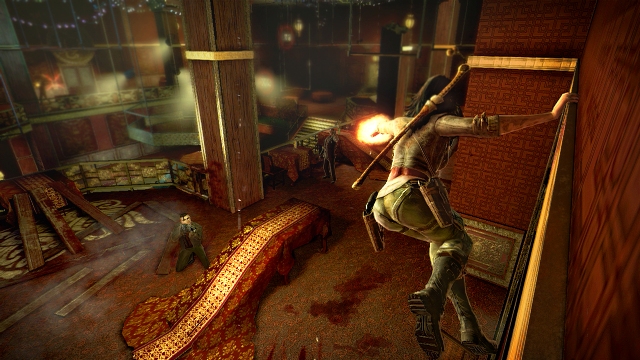
YOU’VE GOT RED ON YOU: What Rubi does possess, and what makes her a great protagonist if not a great character, is a certain skillset and a lot of guns. She’s quick on her feet, light as a feather and as accurate as Colin Farrel’s baldie Daredevil bad-guy Bullseye.
Similarly to Max Payne or John Woo’s Stranglehold, Wet employs its own brand of bullet time during shootouts. Any time you perform an acrobatic move, be it a jump, wall-run or knee-slide, the action slows down and allows you to shoot two targets at once. The lack of a dedicated lock-on makes gunplay awkward at times, but it looks undeniably cool when timing and the environment allow. Ability upgrades bought with earned Style Points allow for even more tricks, such as shooting as you dangle from swinging poles or whip down zip-lines.
Rubi navigates the environment like the Prince of Persia wrapped in alligator skin and bad attitude. Climbing-ledges, ladders and chinning bars provide handholds aplenty, and slow-motion cinematic camera angles provide thrills as she leaps from point-to-point. It’s not always as precise as it could or should be, but it makes for an impressive alternative to running and gunning.
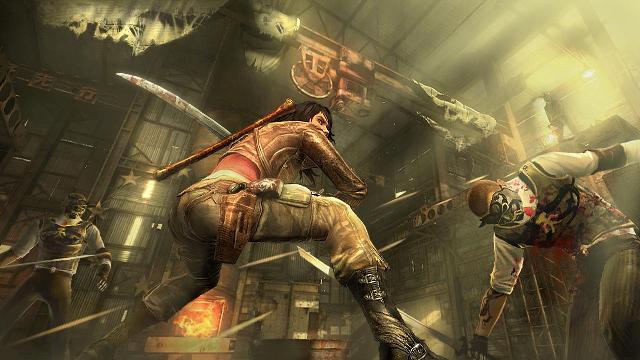
MUSIC TO DIE FOR: Alongside the general grindhouse feel, rough aesthetics and exploitation-era atmosphere, A2M went all-out with Wet’s soundtrack, packing it out with stylised grindcore and a smattering of thrash here and there.
The score was composed by Brian LeBarton, Keyboardist for American alternative musician Beck, who said he wanted “face-melting musical debauchery”, which to a certain extent he achieved. The music is loud, stirring, and particular tracks that kick in during Rubi’s berserker rages are a perfect fit to the frantic, almost dirty combat.
It’s an element that becomes synonymous with the world. Where many games use music to fill quiet space, Wet uses it to increase the tempo of the violence, to immerse you in the world by altering your mood. It’s a decision echoed by Ninja Theory in using Combichrist to add another dimension to DmC‘s fight scenes, putting you in the mood to headbutt your way through a roomfull of scumbags and then giving you control of a certified killing machine and letting you go nuts.
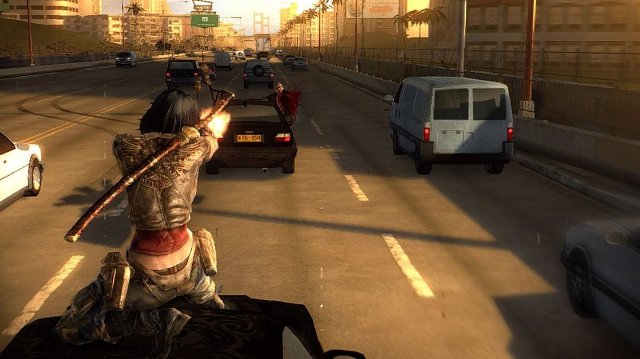
BRUTAL BALLET: In terms of gameplay, Wet has its share of ups and downs. Difficulty spikes take you by surprise, such as when you’re tasked with surviving a gunfight during freefall, popping bad guys and watching what passes for physics in Wet drag them upwards as though death has the power to alter terminal velocity, or a late game quick-time-event car chase that requires such precision it’s hard not to explode with rage.
But for every moment you spend clawing at your scalp in impotent fury, there’s a cathartic thrill waiting just beyond the next loading screen as Rubi – via cutscene – blows a goon away and gets covered in blood, before flipping out on a full-on psychotic rampage. The screen saturates, painting everything in black, white and red, and Rubi gains increased damage and defence as she wades through hordes of henchman like a bloody whirlwind. She really is not a well girl. Such sections alter the pace and pathos of the game, evoking the works of Mark Millar and generating a similar atmosphere, however short-lived.
Enraged or not, enclosed arenas make up a large percentage of each mission. Spawn points must be closed to prevent enemy reinforcements, and you can only regenerate health by upping your score multiplayer, chaining kills and performing stylish executions. It’s a nice dynamic, separating what amounts to modern-day platforming sections with stylish, flashy brutality.
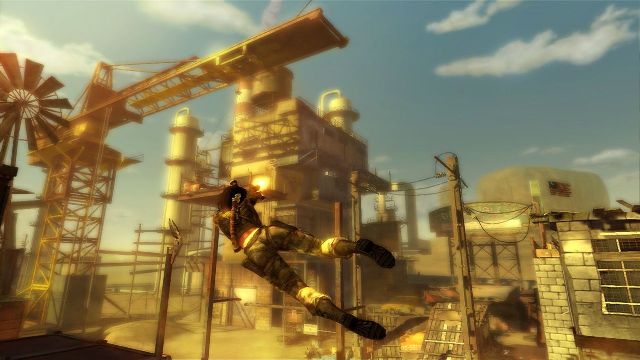
MI CASA ES SU CASA: At certain points in the game, usually when you acquire a new pair of weapons (Rubi eventually has a choice of pistols, shotguns, submachine guns and crossbows), you’ll find yourself in Rubi’s backyard. Like it or not, you’ll have to beat the “challenge” to continue, though luckily each challenges amounts to running a checkpoint-to-checkpoint assault course and shooting pop-up targets along the way.
These moments represent Wet at its most tedious. Unless you’re a big fan of score-attack distractions, you’ll find nothing but a horribly diverting and intrusive sequence that is not only incredibly dull but also throws up questions that Wet doesn’t want you to ask. For example, why is Rubi so hung up on earning shed-loads of money when she lives in a scrapyard and never changes her clothes? We don’t know, and we don’t really care – but what’s more damning is that Artificial Mind and Movement didn’t know either; it was just something that seemed “cool” at the time.
You could also ask the question that, if drinking Jack Daniels regenerates Rubi’s health (you find crates at predetermined spots), why does she only take a quick swig and then throw the rest of the bottle up in the air and shoot it instead of taking it with her for later? Why can you do this several times in a level and still catch the enemy unaware when you prize open your fifth locked door and start shooting folk? Who cares? It looks cool, right?
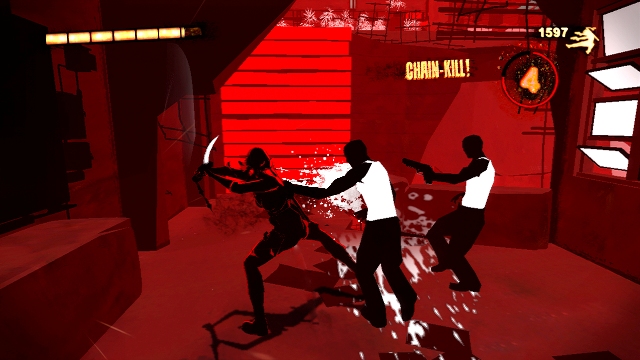
WET DREAM: In the end, what holds Wet back from greatness is Wet itself. It’s a game sabotaged by its own sense of style, that tries so hard to be cool and edgy that its mess of ideas become entangled and trip one another up. It wants to be seen as grungy and faded, yet its deliberately shabby visuals come across as just plain bad, hamstringing basic things like targeting and precision jumping. It wants to be seen as hardcore, but its attempts to do so result in nothing more than severe difficulty spikes that render the game unplayable for some.
Giving Rubi toy monkeys to hunt down with zero context adds a surreal element that the game doesn’t need when it’s striving so hard to be gritty, just as the “classic” intermission style commercials that pop up between stages are horrible and hideously off-kilter with the game’s actual style.
But when Wet gets it right, it really gets it right. There’s a beautiful, balletic thrill awarded every time you successfully clear a room of enemies having taken barely a scratch, when you chain a sequence of ingeniously stylish kills together, running up walls, swan-diving, sliding, leaping and swinging around the arena like the highly-trained assassin Rubi is meant to be.
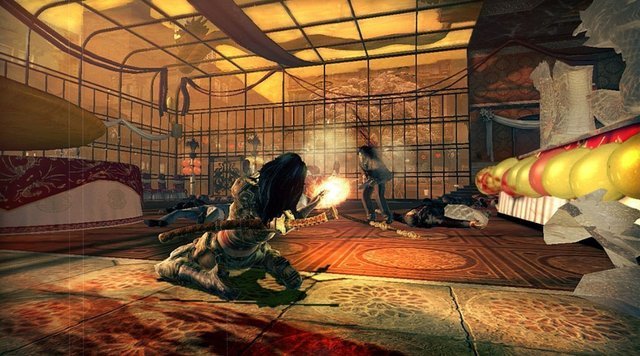
RUBI WOULD IF SHE COULD: Whether or not you ever paid attention to Wet upon release or in the few years since, it’s a title that at least deserves a look in, especially as you can now scoop it out of a bargain bin or off a “pre-owned” shelf for around a fiver. It’s not the greatest game ever made by a long chalk, and it’s certainly not the cleverest, but it is a lot of fun if you come at it from the right angle.
Rubi might not be particularly likeable, and the silly “masquerading villain” storyline may not be particularly original, but if you’re looking for a game that does style and panache better than other, more-accomplished, shooters, you could do a lot worse than Wet.
Wet was developed by Artificial Mind & Movement and published by Bethesda. It currently holds a Metacritic score of 71/100.


